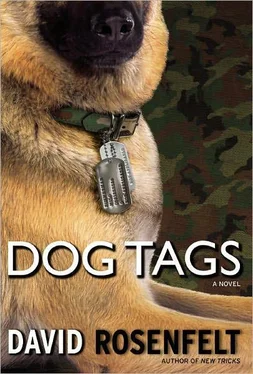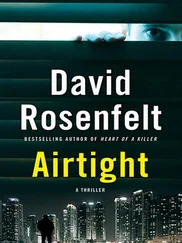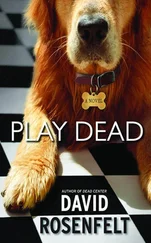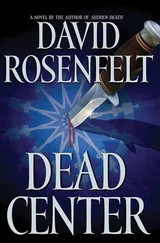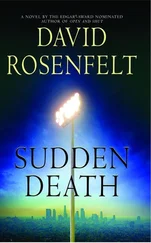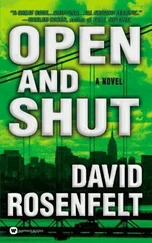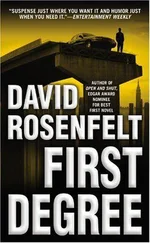Finally, he opens his eyes and nods. “Right. And I was standing here, until I walked away. When the bomb went off I was here.” He points to the places on the sketch.
“Could she have gotten closer to the minister if she wanted to?” I ask.
“Absolutely. Once she got inside, there was really nothing to stop her.”
“Any idea why she didn’t?”
He shakes his head. “No. Not really.”
“Could she have been nervous, and in a hurry?” I ask.
“She certainly should have been nervous; she was taking her own life. Even if she thought she was doing it for her God, it was still a big deal. But she was not in a hurry; I can tell you that. She walked and looked around for at least twenty minutes before she detonated the bomb. The length of time was why I stopped really paying much attention to her.”
“The idea that the minister was the target… was that based on anything other than an assumption?”
“What do you mean?” he asks.
“I mean, did you have any advance warning that there was going to be an effort made to kill him? Did anyone claim credit after the fact?”
“No, none of that. You think there’s a chance they weren’t after him?”
“I certainly don’t see any proof that they were.”
“So who were they after?” he asks.
“I don’t know. Maybe no one. Maybe they were just out to kill people and capture the attention of the world.”
He nods. “Good old-fashioned terrorists. But let me ask you a question… so what? What’s the difference who they were after or why they did it?”
“Because I’m operating under the assumption that the explosion is somehow linked to Erskine’s murder,” I say. “If it isn’t, it isn’t. But I have to follow it as if it is, or we’re nowhere.”
“But even if it’s linked, what does it matter? Even if someone paid Erskine and the other guys off to let it happen, and I’m sure someone did, how does that help defend me against Erskine’s murder?”
“Because I believe the people who paid him off are the people who killed him. So if we solve that murder, we solve this one.”
Unfortunately, we’re not going to solve it before trial this morning, so we head into the courtroom. Eli’s first witness is Marguerite Mooney, a young woman who lives across the street from the Skybar. She and her husband were sitting on their porch, enjoying the evening summer breeze.
She testifies that they saw Milo sitting slightly down the block, apparently tied to a tree. This upset them, because they thought he was abandoned.
“So what did you do?” asked Eli.
“I walked over to the dog, just to make sure he was okay,” Ms. Mooney says.
“What happened next?”
“Well, when I got over there, he growled a little, so I backed off. Then a man who was standing about thirty feet away told me that it was his dog, and that I should leave him alone.”
She identifies the man as Billy, and also mentions that she saw Erskine standing in front of the bar. She has set the scene perfectly for Eli, and the clear implication of her testimony is that Billy and Milo were stalking and lying in wait for Erskine.
There’s not a hell of a lot I can do with her on cross-examination; everything she is testifying to is true, and she hadn’t had nine vodka and tonics to cloud her memory.
“Ms. Mooney, you testified that Mr. Zimmerman is the person you saw that night, the man who told you to keep away from Milo.”
“Yes.”
“You had no trouble identifying him?” I ask.
“None. Where he was standing, there was a streetlight right nearby.”
“So he wasn’t hiding?” I ask. “He wasn’t lurking in the shadows?”
She shakes her head. “No, he was down the street from the bar, so he was right in front of our house.”
“So when he was standing in the light, talking to you, he didn’t seem concerned that you could see his face?”
“No.”
The implication is clear: If Billy was planning to murder someone, why would he be willing to be recognized? Of course, the truth is that Billy’s conduct was overly risky—Milo was going to commit a crime, and Billy’s actions could have tied him to it.
“And you said that Milo had growled at you?”
“Yes.”
“Is it possible that Mr. Zimmerman was trying to protect you from Milo? That he was afraid Milo might bite you?
“I suppose it’s possible.”
There’s nothing left for me to do but reaffirm the testimony she gave to Eli that she and her husband were inside and asleep by the time the murder took place.
Her testimony has been damaging, but not fatal. She placed Billy and Milo at the scene of the crime, but we had already admitted they were there to commit a theft. Nothing she has said has disproven that.
The rest of the day is a succession of witnesses who also place Erskine in front of the bar, with Billy and Milo nearby. Some of them also saw Billy with the gun in his hand, or leaning over Erskine’s body.
No one will admit to seeing the man Billy claims is the actual shooter, or to seeing him drive off. It’s understandable, since the shooting happened down the block, in relative darkness, and they weren’t drawn to walk down and look until after hearing the shots.
I get each witness to admit that it’s possible that there was someone else there, but that will not be close to compelling for the jury.
The case being constructed against Billy will be very hard to tear down.
CHAPTER 55
HE HASN’T FOUND THE ENVELOPE, BUT MILO IS STILL HELPING OUR CASE. He’s not helping actively or intentionally; Milo clearly believes in stepping back and letting the justice system run its course. But his mere presence is having a positive effect.
The media always seems to bombard and depress the public with statistics chronicling all the bad things that happen to Americans. They dutifully report that there is a violent crime committed every twenty-two seconds, a cancer diagnosis every twenty-six seconds, an auto accident every five seconds, and an auto accident injury every ten seconds. It’s the reason I no longer buy watches or clocks with second hands.
The point of this is that, with all the terrible things constantly happening, it’s very difficult to break through the clutter. Certain crimes, for instance those involving JonBenét Ramsey, Natalee Holloway, Chandra Levy, and Laci Peterson, attract tremendous media attention; other, similar ones do not.
Milo is our clutter breaker. His notoriety as a canine thief has given this case a public forum. The fact that it all has roots in Iraq, and that the victim is a high-ranking military officer, would have attracted interest anyway, but nothing like that which Milo’s involvement brings.
Dogs seem to have that effect on people. Rescue a person from a raging river, and you’re on page four. Rescue a helpless dog from the same river, and you’re on the Today show.
I’m taking advantage of this national canine fascination by appearing on Larry King tonight. It’s not my favorite thing to do; the conversations always feel strained and stilted to me, and I feel like I need to rein in my normal obnoxious sarcasm.
I also dislike when Larry opens it up to phone-in questions; they have a tendency to be direct and on point, and thus more difficult to evade. All in all, the thirty minutes I have been allotted will feel like a month.
But we need to shake things up, and we simply don’t have the resources to do so on our own. We need the public to know about our situation, and we need their help in dealing with it. And if the jurors are watching, despite the judge’s admonition to avoid media coverage of the trial, so much the better.
I’ve handled a number of very high-profile cases in recent years, and I’ve made the media rounds on most of them. This is my third time doing the Larry King show, so Larry mercifully doesn’t spend too much time introducing me to his audience.
Читать дальше
